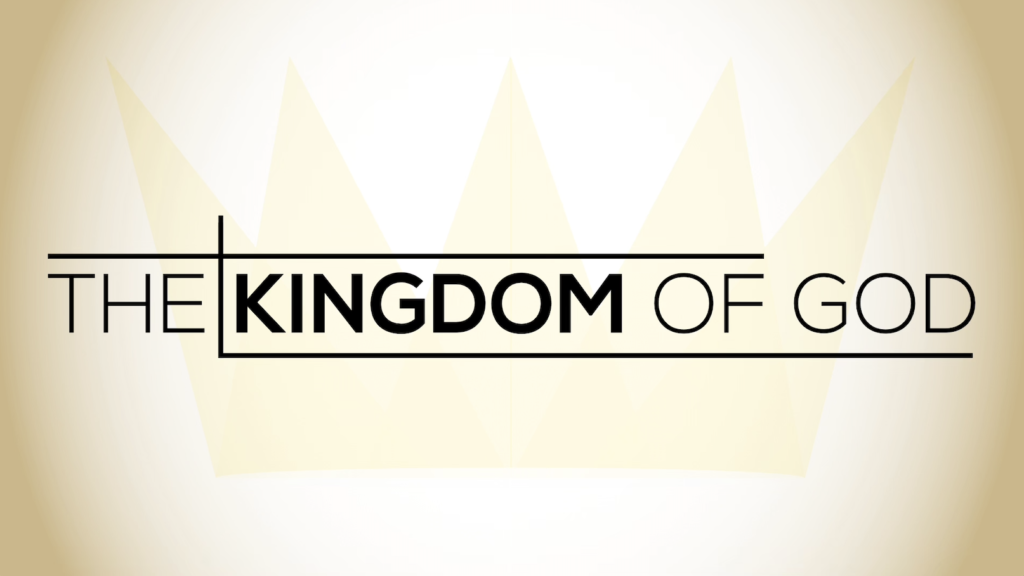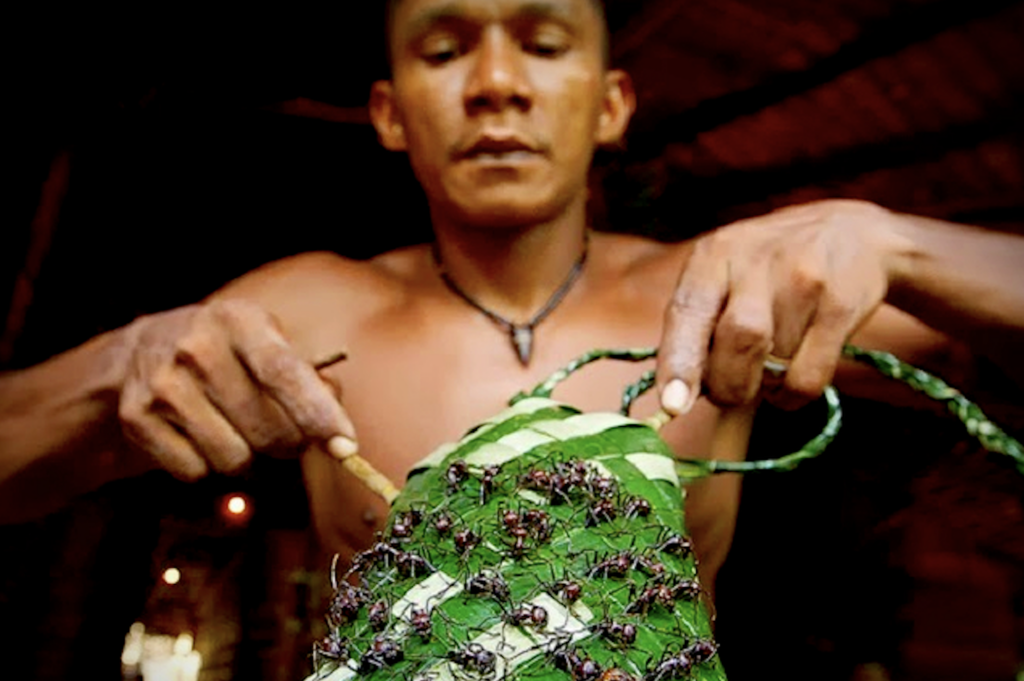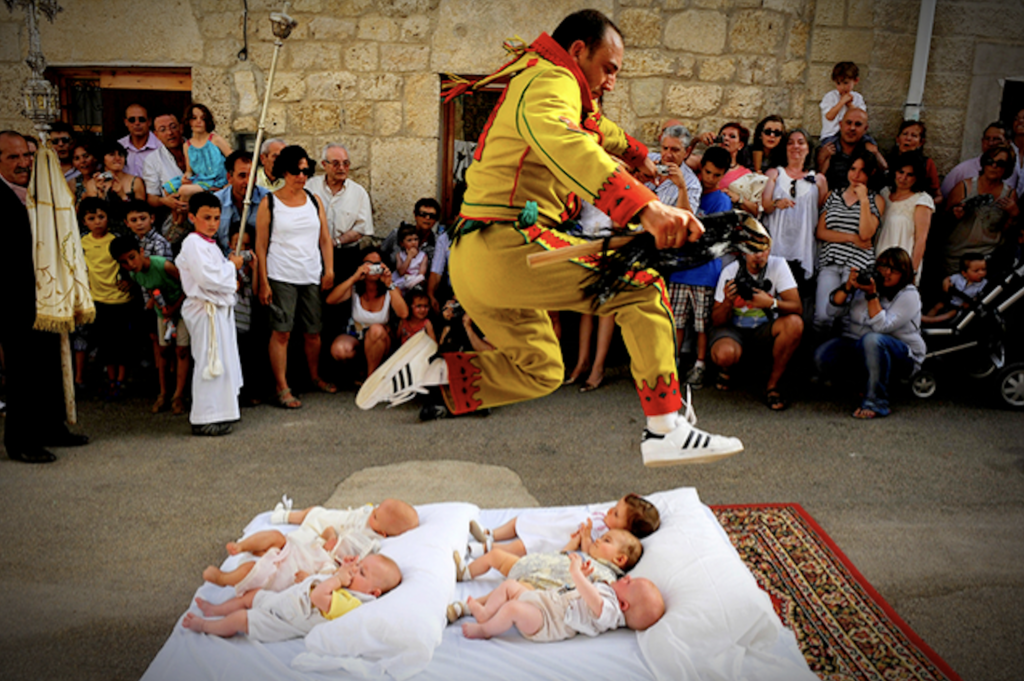
In a very interesting article entitled “Strange Cultural Traditions Around the World,” Rebecca Pittore points out the oddest of the odd customs of the various peoples of the world. For instance:

At age 13, the boys of the Satere Mawe Tribe become men but must prove their worth through the initiation ceremony. The boys head off into the jungle to harvest the angry bullet ants. One sting from the inch-long ant is said to be 30-times more painful than a bee sting, or about as painful as a gunshot, giving them their name. Back in the village, the chief elder intoxicates the ants in an herbal mixture, knocking them out just long enough to weave them into a special pair of gloves, with the stingers pointing inwards. When the ants wake up, the ceremony begins. The boys show courage by placing their hands in the gloves for 10 minutes each while being led in a traditional dance. The ceremony repeats 19 more times before the young boys can call themselves men. According to the Satere Mawe traditions, the bullet ant initiation prepares them for the pain of adulthood and how to manage pain without showing weakness.
Or this:

[The El Colacho] tradition in Castrillo de Murcia, in the north of Spain, has its origins in pagan rituals and has been a local tradition since the 17th century. As a way to cleanse a new baby’s soul, the tradition is commonly known as ‘baby jumping’. Every year, on the Sunday after the Feast of Corpus Christi, the event, which is now a mix of both pagan and Catholic traditions, begins with a procession through town and at the end of the walk, babies born in the previous year are laid on a mat. Men dressed as the devil run between and jump over the babies. Next, the leaders of the Catholic Church in the Burgos Region cleanse them with holy water.[1]
My goodness! There are lots of strange customs in the kingdoms of the world, customs that make outside observers ask, “Why would they do that?”
But there is another Kingdom with its own odd customs by which the world is confused. I am speaking of the Kingdom of God.
This Kingdom is the “already/not yet” Kingdom; the Kingdom that has come in Jesus yet is coming with the coming of Jesus.
What we want to do is consider the “already” aspect of the Kingdom of God. How does its arrival in Jesus and our entry into it through Jesus affect us here and now, right where we are? What does this Kingdom look like in our lives? What are our strange customs?
Citizens of the Kingdom of God practice the strange custom of gaining by letting go.
There is, first of all, a strange kind of addition by subtraction in the Kingdom of God. In the Kingdom, all is gained when all that used to be considered valuable is set aside.
In Matthew 6, King Jesus says:
31 Therefore do not be anxious, saying, ‘What shall we eat?’ or ‘What shall we drink?’ or ‘What shall we wear?’ 32 For the Gentiles seek after all these things, and your heavenly Father knows that you need them all.
Here is the way the kingdom of the world works: a mad dash after things. Food, drink, clothes, possessions. These are the “all these things” mentioned in verse 32, these things that “the Gentiles seek after.” They are the “things” of our earthly lives. These are the things that the world is anxious about, obsessed with.
In the Kingdom of God, however, there is strange custom of setting aside these anxieties. Watch:
33 But seek first the kingdom of God and his righteousness, and all these things will be added to you. 34 “Therefore do not be anxious about tomorrow, for tomorrow will be anxious for itself. Sufficient for the day is its own trouble.
But seek first the Kingdom of God. Meaning, let all these other concerns go. Do not put these things first. These things will make you anxious. Do not be worried. Do not fret. Do not obsess.
But seek first the Kingdom of God!
If the Kingdom of God is first, then it means all these other things are second, at best.
In other words, let go of these things.
And, when you do, Jesus tells us, “all these things will be added to you.”
Addition by subtraction.
There is a strange arithmetic in the Kingdom. If you put the things you think you need and the things you love first, you will lose them. But if you will lose them and put the Kingdom of God first, you will get them back!
In the Kingdom, we gain by letting go.
Citizens of the Kingdom of God practice the strange custom of redefining the absolute essentials.
Furthermore, in the Kingdom, even the things we need—the absolute necessities of life—are redefined. Paul, in Romans 14, writes this of the Kingdom:
17 For the kingdom of God is not a matter of eating and drinking but of righteousness and peace and joy in the Holy Spirit.
The true necessities of the Kingdom of God are not food but righteousness, peace, and joy, all in the Holy Spirit.
This helps us understand a number of fascinating passages in the New Testament. In Matthew 16, we read:
5 When the disciples reached the other side, they had forgotten to bring any bread. 6 Jesus said to them, “Watch and beware of the leaven of the Pharisees and Sadducees.” 7 And they began discussing it among themselves, saying, “We brought no bread.”
Jesus warns against bad leaven, bad bread. The disciples are confused. Jesus rebukes them for this and then we read:
12 Then they understood that he did not tell them to beware of the leaven of bread, but of the teaching of the Pharisees and Sadducees.
So the bad bread of the Pharisees was what they were teaching about God, their spiritual offerings we might say.
Similarly, in the Kingdom of God, divine truth is good bread! After being tempted by the devil in Matthew 4, Jesus pointed to this reality.
4 But he answered, “It is written, “‘Man shall not live by bread alone, but by every word that comes from the mouth of God.’”
This is most astonishing! The bread of the Kingdom and therefore the absolute necessity of the citizens of the Kingdom, is life with God, with the truths and the ways of God.
This is clear in John 4.
31 Meanwhile the disciples were urging him, saying, “Rabbi, eat.” 32 But he said to them, “I have food to eat that you do not know about.” 33 So the disciples said to one another, “Has anyone brought him something to eat?” 34 Jesus said to them, “My food is to do the will of him who sent me and to accomplish his work.
This is the way of the Kingdom. This is the way of life. To be nourished on the bread of God.
Citizens of the Kingdom of God practice the strange custom of calling freedom “slavery” and calling slavery “freedom.”
There are other strange customs in the Kingdom. For instance, citizens of the Kingdom call “slavery” what the world calls “freedom” and call “freedom” what the world calls “slavery.”
In 1 Corinthians 6, Paul offers a list of the behaviors of the world that are outside of the Kingdom life. He writes:
9 Or do you not know that the unrighteous will not inherit the kingdom of God? Do not be deceived: neither the sexually immoral, nor idolaters, nor adulterers, nor men who practice homosexuality, 10 nor thieves, nor the greedy, nor drunkards, nor revilers, nor swindlers will inherit the kingdom of God.
These behaviors are not the way of the Kingdom of God. They are the way of the fallen kingdom of the world. But then Paul addresses citizens of the Kingdom when he writes:
11 And such were some of you. But you were washed, you were sanctified, you were justified in the name of the Lord Jesus Christ and by the Spirit of our God.
In other words, you used to do those things, before you entered the Kingdom. Now you do not do those things, because you have a King who gives you a new heart.
What the world calls freedom—its lusts and its desires and its celebrations—is actually seen to be slavery when compared to the freedom that Jesus gives.
In 2 Peter 2, Peter, speaking of the false teachers harassing the first-century church, writes:
19 They promise them freedom, but they themselves are slaves of corruption. For whatever overcomes a person, to that he is enslaved.
The world is obsessed with its freedom, which it defines as the freedom to do whatever a person wants whenever a person wants. But this is actually enslavement to corruption, for it positions human desire as the greatest good. So being what you want to be and doing what you want to do becomes all important…and so it becomes a god…and so we become that god’s slaves. “Whatever overcomes a person, to that he is enslaved.”
Nowhere is this spelled out more clearly than in Romans 6 by Paul.
20 For when you were slaves of sin, you were free in regard to righteousness. 21 But what fruit were you getting at that time from the things of which you are now ashamed? For the end of those things is death. 22 But now that you have been set free from sin and have become slaves of God, the fruit you get leads to sanctification and its end, eternal life. 23 For the wages of sin is death, but the free gift of God is eternal life in Christ Jesus our Lord.
What a glorious paradox! When you thought you were free outside of Jesus, you were actually a slave. But when you became a slave to Christ, then and only then did you become free. Entry into the Kingdom through the blood of Christ opens your eyes to that great paradox.
Citizens of the Kingdom of God practice the strange custom of gathering to sing and celebrate the Kingdom and the King.
Another strange custom of the Kingdom is the way that the citizens of the Kingdom gather to sing and celebrate and worship the King! The writer of Hebrews, in Hebrews 12, directly links worship to the Kingdom of God. He writes:
28 Therefore let us be grateful for receiving a kingdom that cannot be shaken, and thus let us offer to God acceptable worship, with reverence and awe.
The fact that (a) we have received the Kingdom and (b) the Kingdom we have received “cannot be shaken” compels us to offer God “acceptable worship, with reverence and awe.”
We worship because we have a King and He has brought us into His kingdom!
This worship we offer God is sincere and exuberant and joyful and from the heart. It is a worship of song and a worship of prayer and a worship of proclamation.
There are other odd elements of it. It is a worship in which citizens of the Kingdom are dunked in water as a sign of their identification with the crucified, buried, and risen again King, Jesus! This is called baptism. This is the great initiatory act of Kingdom citizenship: baptism.
But perhaps the most surprising element of this worship was spelled out by Jesus in Matthew 26.
26 Now as they were eating, Jesus took bread, and after blessing it broke it and gave it to the disciples, and said, “Take, eat; this is my body.” 27 And he took a cup, and when he had given thanks he gave it to them, saying, “Drink of it, all of you, 28 for this is my blood of the covenant, which is poured out for many for the forgiveness of sins.
Astonishing! Citizens of the Kingdom not only identify with their Kingdom through the burial and resurrection in water called “baptism,” but also through the eating of symbols of the King’s flesh and blood. This is called “the Lord’s Supper” or “Communion.” This is the great sustaining act of Kingdom citizenship.
The outside world cannot understand this act, this Lord’s Supper, this bread and juice. The pagan Romans used to accuse the early Christians of cannibalism over this. But, no, it is a way for us to say that we are in Christ and Christ is in us, that our food and drink is the way of Jesus and that our very lives are bound up with the cross and empty tomb of Jesus.
It is our way of saying that we are the people of God in Christ, followers of King Jesus. It is our way of saying that our walk with Jesus is not one of outward show or merely verbal proclamation, but rather of an identification with Him that is radical and transformative.
He is bread and drink to us.
He is life to us.
We eat to remember.
We drink to proclaim.
King Jesus is our very life!
Behold the strange and beautiful customs of the Kingdom of God!
[1] https://www.alltherooms.com/blog/dark-tourism-the-most-unusual-customs-around-the-world/
